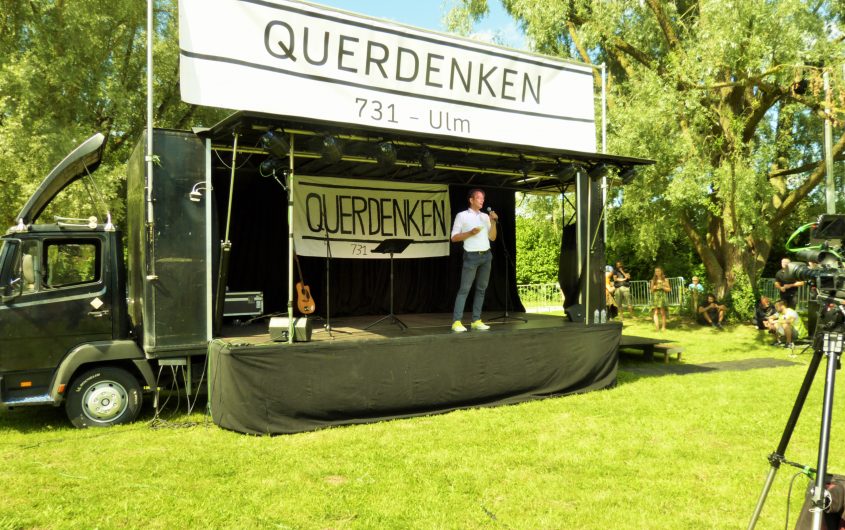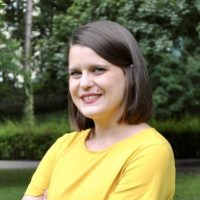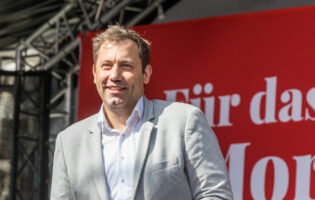
Wald-Burger8 via Wikimedia Commons
Mainstreaming Extremism or Radicalizing the Center

Constanze Jeitler
University of Tübingen
Constanze Jeitler is a historian and a PhD researcher with the ERC-funded project "PACT: Populism and Conspiracy Theory" at the University of Tübingen (Germany). Before joining the PACT project, she was a parliamentary assistant and advisor in the Austrian parliament and worked for the OSCE election assessment mission to Austria in 2017. Ms. Jeitler hold a Master's degree in Comparative History from Central European University and in Film and Media Studies from the University of Vienna.
In her PhD dissertation, Ms. Jeitler focuses on the historical significance of conspiracy theories for populist parties and right-wing movements in Austria as well as their networks in the German-speaking world and beyond. Her other research interests include the history of National Socialism, memory studies and memory politics, transnational history, oral history, and ethnographic methods in history.
How the Querdenker Movement Challenges the Democratic Order
In Germany as elsewhere, the COVID-19 pandemic has pulled conspiracy theories onto the center stage of public debate. The so-called proponents of the Querdenken movement have been the main organizers of protests against pandemic policies in Germany.[1] The Querdenker is a non-monolithic movement without a clear organizational structure but rather a loose coalition of groups and individuals from various backgrounds. They are all united under the umbrella of criticism of COVID-19 policies. Conspiracy theories are widespread among proponents and play a major role in the mobilization of the movement. As the pandemic drags on and people have been living under restrictions, lockdowns, mask mandates, and other anti-pandemic policies for more than eighteen months, some supporters of the Querdenken movement seem ready to take violent action. This article provides a characterization of the Querdenken milieu in Germany and depicts the role conspiracy theories play within the movement. In conclusion, I will briefly discuss how these challenges to democracy can and might be addressed in Germany.
The Appeal of Conspiracy Theories
Conspiracy theories—that is, the belief that an influential and covert agency is responsible for an event or a development—are not inherently dangerous. Sometimes, they are even entertaining. They do not contain clear instructions for actions. What makes them dangerous is their “participatory character.” They are participatory because, while providing a simple explanation for complex situations, they always invite us to do our own research and to find more hidden explanations and connections. They engage us directly in the formulation of ideas, often in a collaborative way when joining other like-minded individuals in online communities to discuss potential hidden links and machinations. In the age of the internet, they are easily accessible and engaging, particularly in times of crises, fueling the erosion of trust in democracy and political institutions.
Stuttgart, July 7, 2020
In July 2020, I witnessed one of the initial protests of the Querdenken movement in Stuttgart in Southern Germany by chance. The protest united critics of the hygiene mandates and restrictions, anti-vaxxers, drum circles, proponents of homeopathy, esotericism, and anthroposophy,[2] Christian fundamentalists, monarchists, and even supporters of the Hong Kong democracy movement. While the atmosphere was rather casual—acts on stage included dance groups and rappers—some protestors’ signs promoted conspiracy theories, attacked the media, and relativized the Holocaust—likening Nazi atrocities to mask mandates, for instance. The protesters held posters and banners against alleged population-wide “experiments” with testing and vaccines or accused the media of being accomplices in a “new Holocaust.” What struck me was not only the protesters’ diverse motivations and messages but also that most of them seemed to be over 40 years old and belong to the well-earning middle class.
The Average Querdenker
First exploratory studies into the Querdenken milieu and COVID-19 protests in the German-speaking world seem to confirm my observations: Oliver Nachtwey, Robert Schäfer, and Nadine Frei from the University of Basel describe the average Querdenker as middle class, over 40, and rather well-educated.[3] In terms of voting patterns, protesters previously predominantly voted for the Green party, the left-wing populist Die Linke, or the right-wing populist AfD. The center parties, the conservative CDU/CSU and social-democrat SPD, are underrepresented among the protesters. However, a majority indicated that they would vote for non-established parties such as Die Basis in the federal Bundestag election in September 2021.[4] Founded in July 2020, Die Basis unites believers in anthroposophy and esotericism with holders of far-right ideologies. The authors underline that beliefs in alternative medicine, esotericism, and anthroposophy play an important role in the Querdenken movement and that views can be generally characterized as anti-science, attesting to the movement’s generally anti-authoritarian character. However, extremist actors, groups, and symbols have been met with indifference or even welcomed at protests in the past.
While voting patterns, political attitudes, and motivation for joining the protests are diverse, Querdenker are united in their distrust of the government, state institutions, and the mainstream media. An overwhelming majority (more than 80 percent) think that “the government is exaggerating the danger of the virus” and that “the mainstream media’s coverage of the protests is distorted and derogatory.” Decreased trust in democracy and its institutions has been linked to belief in conspiracy theories in the past.[5] Therefore, it is not surprising that conspiracy theories are widespread within the Querdenken movement, more widespread than among the German population in general. The biennial Mitte-Studie, a survey on far-right attitudes in mainstream society, found that 23 percent of Germans believe that “secret organizations have an influence on political decision making,” 20.5 percent believe that political leaders are the “puppets of secretive powers.”[6] Among the Querdenker, this belief is shared by more than 50 percent.[7]
The distrust of public institutions within the movement leads to a strong conviction among supporters that democracy and freedom of speech are under attack by the political, scientific, and media elites. Querdenker are convinced that their country is in decline and drifting towards dictatorship. As a consequence, they consider the COVID-19 policies to be authoritarian measures and frame their protest as being about the very core of democracy and the rule of law. They see themselves as heroic resistance fighters against an undemocratic “Corona dictatorship” or even self-sacrificing martyrs for their cause. This is where anti-vaxxers, pro-life activists, and believers in alternative medicine and esotericism find common ground with and inspiration from extremist groups. They are united in their distrust in institutions, feeling of decline, alienation from the political mainstream, and, last but not least, belief in conspiracy theories.
Idar-Oberstein, September 18, 2020
That these unifying characteristics can become a toxic mixture became obvious in late summer 2021 in Idar-Oberstein, Rhineland-Palatinate. In the early evening of September 18, a customer walked into a gas station, pulled out a handgun, and fatally shot an employee. Hours before, the suspected attacker and the victim argued about the mask mandate. The suspect, a 49-year-old web developer, was not known as a dangerous extremist to the authorities. However, an analysis of his social media activities soon made it obvious that he spread conspiracy theories and fantasies of violence.[8] The suspect, who fits the prototypical Querdenker profile outlined above, was in illegal possession of the murder weapon and justified the fatal attack with his frustration with the pandemic and the COVID-19 rules, claiming that he saw no other way of setting an example, blaming the overall situation on the victim.
It is unclear whether the suspect had previously joined the Querdenken movement on the streets. However, the physical violence against employees in shops and elsewhere in the service sector who are tasked with enforcing distancing rules is increasing. The perpetrators justify their actions with resistance against the “Corona dictatorship.” This suggests that some Querdenker are becoming more radical and readier to engage in acts of violence or sabotage. This is in line with research that suggests that belief in conspiracy theories may lead to forms of non-normative political engagement or even criminal behavior.[9]
Conclusion
The composition of the Querdenken movement is heterogeneous and complex. It attracts people from a variety of backgrounds and beliefs, but this ideological and motivational incoherence does not make parts of the movement less dangerous. The majority of Querdenker may never engage in violent forms of extremism, but a handful might do so. One of the major reasons for this might be found in conspiracy theories and the distrust in institutions widespread within the movement. Conspiracy theories and distrust may serve as a bridge between the various groups within the movement. Particularly the participatory character of conspiracy theories may unite a diverse range of actors in joint research and debates about the “true” meaning of events and developments. As the pandemic drags on, this worldview might escalate into a movement that exhibits a strong self-image of resistance and martyrs. This radicalization bears the danger of leading to violent activities and attacks.
How can we stop the appeal of conspiracy theories in general and the radicalization of the Querdenken movement in particular? First, only 10 percent of the Querdenker are under the age of 30. Until now, the movement does not seem to have reached the younger strata of the population. We need more education on media and social literacy as well as prevention work against radicalization. Germany has already done a lot in this area; however, this movement is posing completely new challenges as it is very heterogeneous. Second, actors and groups who might engage in extremism need to be closely monitored by the authorities. The Querdenken movement has been under surveillance by the German Federal Office for the Protection of the Constitution (Verfassungsschutz). This is a first step, but the secret service has already admitted that it is so heterogeneous and difficult to grasp in its entirety that surveillance does not come easy.[10]
[1] Querdenken translates as “lateral thinking.” The term has been used since the 19th century to describe “futile speculations” and an “alternate way of reasoning.” Later, intellectuals of the New Right in the German-speaking world described themselves as Querdenker to signal their opposition to the mainstream. As a name for the movement against COVID-19 policies and its supporters, the term is both used as a self-designation and in a pejorative sense.
[2] For more information on the status of alternative medicine, anthroposophy, esotericism in Germany, see: Philipp Oltermann, “Ginger root and meteorite dust: the Steiner ‘Covid cures’ offered in Germany,” The Guardian, 10 January 2021, https://www.theguardian.com/world/2021/jan/10/ginger-root-and-meteorite-dust-the-steiner-covid-cures-offered-in-germany
[3] Oliver Nachtwey, Robert Schäfer, and Nadine Frei, “Politische Soziologie Der Corona-Proteste” (SocArXiv, December 16, 2020), https://doi.org/10.31235/osf.io/zyp3f.
[4] DieBasis stands for Basisdemokratische Partei Deutschlands (Grassroots Democratic Party of Germany).
[5] Roland Imhoff and Pia Lamberty, “How Paranoid Are Conspiracy Believers? Toward a More Fine-Grained Understanding of the Connect and Disconnect between Paranoia and Belief in Conspiracy Theories,” European Journal of Social Psychology 48, no. 7 (2018): 909–26, https://doi.org/10.1002/ejsp.2494.
[6] Andreas Zick, Beate Küpper, and Franziska Schröter, eds., Die geforderte Mitte: rechtsextreme und demokratiegefährdende Einstellungen in Deutschland 2020/21 (Bonn: Dietz, 2021).
[7] Nachtwey, Schäfer, and Frei, “Politische Soziologie Der Corona-Proteste.”
[8] Maik Baumgärtner, Jörg Diehl, et. al., “‘Bewaffneter Widerstand, ab in den Untergrund’: Bluttat von Idar-Oberstein zeigt Radikalisierung der Coronaleugner,” Der Spiegel, 24 September 2021, https://www.spiegel.de/panorama/justiz/der-fall-idar-oberstein-zeigt-die-radikalisierung-der-corona-leugner-a-61c1274b-e937-4cf6-99c3-cc2a4c43c6ce?context=issue
[9] Roland Imhoff, Lea Dieterle, and Pia Lamberty, “Resolving the Puzzle of Conspiracy Worldview and Political Activism: Belief in Secret Plots Decreases Normative but Increases Nonnormative Political Engagement,” Social Psychological and Personality Science 12, no. 1 (January 1, 2021): 71–79, https://doi.org/10.1177/1948550619896491; Daniel Jolley et al., “Belief in Conspiracy Theories and Intentions to Engage in Everyday Crime,” British Journal of Social Psychology 58, no. 3 (2019): 534–49, https://doi.org/10.1111/bjso.12311.
[10] Michael Götschenberg, “Verfassungsschutz: ‘Querdenker’ werden nun bundesweit beobachtet,” Tagesschau, 28 April 2021, https://www.tagesschau.de/inland/verfassungsschutz-querdenker-103.html
This article is part of the AGI project “The Importance of the Transatlantic Partnership in Times of Global Crises” and is generously funded by the European Recovery Program (ERP) of the Federal Ministry for Economic Affairs and Climate Action (BMWK).









